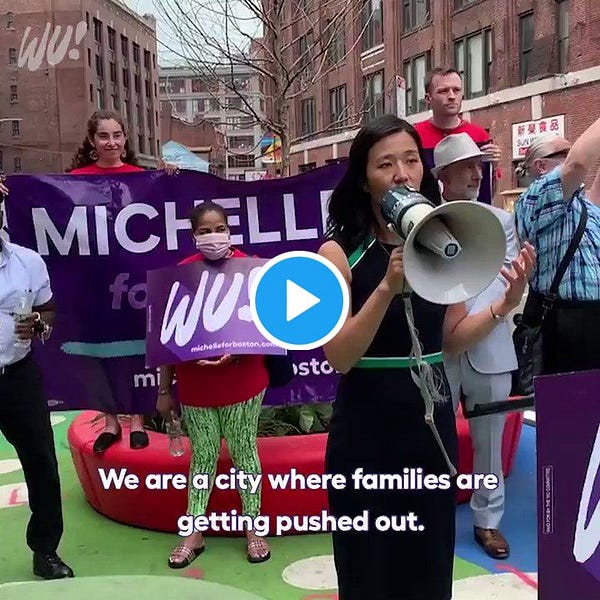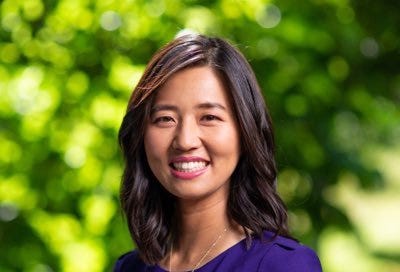Wu Train’s Next Stop: Boston City Hall
City Councilor Michelle Wu is leading the pack in the race to become Boston's next mayor.
By Nikki Rojas
Boston’s mayoral race is heating up with the preliminary election just 41 days away. This year’s election is one of the most diverse in the city’s history. Four of the five candidates vying to become Boston’s next mayor are women. Chief among them: City Councilor Michelle Wu.
Wu, a Roslindale resident who serves as an at-large city councilor, has remained firmly at the forefront of the race. A recent poll released by the Boston Globe and Suffolk University found Wu leading Acting Mayor Kim Janey among likely preliminary voters, 23.4 percent to Janey’s 21.6 percent. The mayoral hopeful has also racked up big-name endorsements, including one from Senator Elizabeth Warren and the Sunrise Movement Boston.
In the last few months of the campaign, Wu’s star power has risen considerably among voters who want to hop on the “Wu Train.” She was labeled Gen Z’s favorite politician by Refinery 29 and has amassed a solid following on social media, including Tik Tok.
I spoke with Michelle about her historic campaign, key issues facing Boston voters and why she’s the only mayoral candidate on TikTok.
Nikki: You’re part of a historic mayoral race here in Boston, with four female candidates leading the way. Why do you think it took so long for Boston to not only accept a non-white female acting mayor but to also support such a diverse set of female candidates?
Michelle: It’s been a rapid transformation of Boston politics in the time that I’ve been serving on the council. I’m not in my eighth year as an at-large councilor. When I first ran for office, that year we doubled the number of women serving on the council from one to two when I joined then-Councilor Ayanna Pressley. So, we have seen a shift in city government. I’ve been proud to be part of leading the charge for the City Council to be more responsive, reflective and proactive about our policymaking and I’m eager to bring that leadership to the mayor’s office.


Nikki: We all know that Boston has a housing affordability problem. You’ve released a pretty extensive plan to tackle this issue, including reforming the Inclusionary Development Policy to increase the affordable housing requirement, dedicating $200M in federal funds from the American Recovery Plan and even the possibility of bringing rent stabilization back on the ballot. Right now you’re the only mayoral candidate to support rent stabilization in any way. Why do you think that is?
Michelle: Boston is in the midst of an urgent housing crisis, and families are being displaced from our city. People across the board can’t afford to live in Boston and now thousands are facing eviction after the lifting of the evictions moratorium. So the real question isn’t why I’m the only candidate for providing relief, it’s why everyone else isn’t. This is urgent across the city. It’s the top issue I hear from residents all across our neighborhoods and we need to take every possible step to increase the supply of housing and also to stabilize communities and keep people in their homes.
Nikki: Do you think that Boston voters are ready to support that?
Michelle: This is the exciting part of elections. I always believe in putting forward the bold ideas, having conversations and organizing through the campaign in order to earn a mandate for change. I think sometimes the common wisdom is to play it safe, to avoid bringing up any controversial ideas, or to duck the hard questions. But when we do that we perpetuate the inequities across the city and we reinforce the status quo, which has been failing for too many of our families across Boston right now.


Nikki: Shifting focus a bit, you have been incredibly open about your mother’s mental health issues and how that affected you and your family, which I think is amazing. It’s clear that mental health awareness is important to you. How do you hope to improve mental health resources for the people of Boston if you’re elected?
Michelle: We need to use every platform that city government has to connect people with services. There’s so much potential for Boston residents really to have wraparound service through our school system, through connections with community centers and public housing, and for city government to help close that gap. But what I know from my family’s experience is that even when treatment is available, that gap is made even bigger by stigma, and so I talk about my family’s story, even though it can feel difficult, every single time because it’s important to help break that stigma and to show how many people are living with health conditions that can be treated and that we just need to really remove barriers to not just accessing the treatment, but feeling empowered to do so.
Nikki: As you’ve noted throughout your campaign, Black, Latinx and other underserved communities in Boston have found themselves at an economic disadvantage due to discriminatory policies and deeply ingrained systemic racism. If elected, how do you hope to start addressing those issues in the first 100 days in office and maybe even beyond that?
Michelle: We have tremendous resources and it’s unconscionable that our racial wealth gap is among the largest in the country. That our disparities, along health, education access, transportation access, air quality all fall along the lines of zip code, race and income. So, I bring an intersectional and urgent approach to our issues. We’ve laid out a number of plans in great detail so we can hit the ground running and really take on the root causes of racial injustice through our interconnected plan.


Nikki: Your campaign has a pretty impressive following on social media, including TikTok. In fact, I believe you’re the only mayoral candidate on the Gen Z-beloved platform*. Would you say that your campaign has been able to reach younger voters this way and how do you think apps like TikTok will change campaigning in the future?
Michelle: Especially during the pandemic, it’s been really difficult to find and build community without the ability to actually see people safely in person. So being able to take down some of the barriers to build community through social media and online and meeting people where they’re at has helped transform what’s possible for not just politics, but policymaking as well. Of course, we are pushing hard to close the digital divide and we’ve put forward a plan to ensure that Boston will lead the way on that front. We’ll continue to meet people where they’re at. Not just physically in person but through social media and really finding ways to connect across generations and issue areas. I’m a millennial and so I grew up with the appearance of various social media platforms over time. So for me to stay connected with my community and my networks, it’s been a really natural step to make sure that that follows through in our campaign as well.


*Correction: I previously reported that Michelle Wu was the only Boston mayoral candidate on Tik Tok. However, City Councilor Andrea Campbell is also on TikTok, she can be found @andreaforboston.
You can learn more about Michelle Wu’s campaign at Michelle for Mayor.
Writer’s note: Questions and answers have been lightly edited for clarity.




